
FINDING THE WORDS ‘Aiiieeeee!’ and its 50-Year Literary Legacy


FINDING THE WORDS ‘Aiiieeeee!’ and its 50-Year Literary Legacy
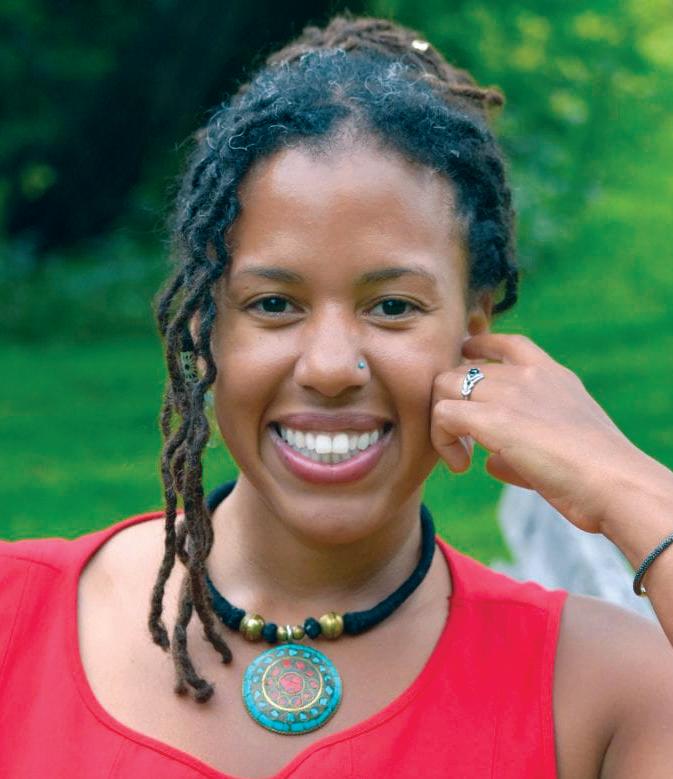 BY MAYA ANGELA SMITH , ASSOCIATE DEAN FOR EQUITY JUSTICE & INCLUSION COLLEGE OF ARTS & SCIENCES
BY MAYA ANGELA SMITH , ASSOCIATE DEAN FOR EQUITY JUSTICE & INCLUSION COLLEGE OF ARTS & SCIENCES
Welcome to the spring 2024 issue of Viewpoint. As long as I can remember, I have been fascinated by the power of language. I was the shy kid who never spoke up in class, the weird kid pulled out of class to attend speech therapy, the lone Black kid afraid to open my mouth because my words could be attributed to a whole race. In my silence, I often yearned to find my voice, to share it with others and to learn what others had to say to me. It’s why I studied linguistics, why I choose to center interviews in my research practice and why I thoroughly enjoy exploring language in close textual readings. I have a voice now because of the liberal arts education I had access to, and as associate dean for Equity, Justice, and Inclusion in the College of Arts and Sciences (CAS), one of my main goals is to best support faculty and staff as they work with students to find their own voices.
This issue of Viewpoint really emphasizes the power of language. Shawn Wong’s reflection on “Aiiieeeee,” in which he and others transformed a stereotype meant to demean into a seminal anthology of East Asian American literature, demonstrates
how language allows us to rewrite our stories. Rasheena Fountain shows us how to experiment with language and structure in order to unapologetically claim space, history and narrative. Colleen McElroy, the first Black woman promoted to full professor at the UW, proved through her prolific lyricism that language has no bounds. Now an ancestor, McElroy—through her words—continues to guide students as they learn to articulate who they are. Tiana Cole and Brad Blackburn’s podcast, “Identity Unboxed,” amplifies Black voices, conveying lived experiences that have so much to teach us. All of these people have ties to CAS, which I view as the core teaching, learning and community hub at UW—the place where nearly 90% of all UW students will take at least one class. The equity-minded work highlighted in this Viewpoint issue showcases the CAS values of creating a supportive, inclusive and just environment across our classrooms, labs and arts spaces. These stories help model to students how to take ownership of their own voices, setting us up for the next generation of writers, orators, poets, polyglots, storytellers and change-makers.
Phone: 206-543-0540
Fax: 206-685-0611
Email: vwpoint@ uw.edu
Viewpoint on the Web: UWalum.com/viewpoint
VIEWPOINT STAFF
Paul Rucker, ’95, ’02 PUBLISHER
Hannelore Sudermann, ’96 EDITOR
Carol Nakagawa ART DIRECTOR
Caitlin Klask, Shin Yu Pai WRITERS
April Hong, Dennis Wise CONTRIBUTING PHOTOGRAPHERS
Nancy Joseph, Eric Moss, CONTRIBUTING WRITERS VIEWPOINT ADVISORY COMMITTEE
Rickey Hall Vice President for Minority Affairs & Diversity University Diversity Officer
Tamara Leonard Associate Director Center for Global Studies Henry M. Jackson School of International Studies
Eric Moss Director of Communications Office of Minority Affairs & Diversity 4333 Brooklyn Ave. NE, Box 359559 Seattle, WA 98195-9559
EDDIE DEMMINGS, E.J. BRISKER AND EDDIE RAY WALKER left their mark on the University of Washington with their ideas and their activism—which Walker further expressed with his paintbrush. All three arrived on campus surprised to find only a few other Black students. As founding members of the UW’s Black Student Union in 1968, they demanded the University do more to recruit and support Black, Native American, Chicano/a and other students of color. They also demanded a more diverse faculty, called for a Black studies program and envisioned an ethnic cultural center. “We needed a building. We needed a space to be together,” Walker said in 2022 on the occasion of the 50th anniversary of Samuel E. Kelly Ethnic Cultural Center. Their activism catalyzed the creation of the Office of Minority Affairs & Diversity and the Educational Opportunity Program.
Through their advocacy and vision, Walker, Brisker, Demmings and their classmates changed the UW in myriad ways. Perhaps, Walker’s most visible contribution is his mural painting “Bearers of Culture” which hangs near the ceiling in the Kelly ECC. He didn’t ask for permission to do the project, he said. He just bought his own paint, drew the outline freehand and “painted it before anyone could stop me.”
Brisker, a leader in in the effort to create a Black studies program and longtime activist, died on Sept. 21. Walker (pictured below) continued with his art and activism after graduation. He died on December 4. Demmings, who went on to practice law and became general counsel for a public workers’ labor union, died on January 24. Find more of their story in the June issue of University of Washington Magazine.
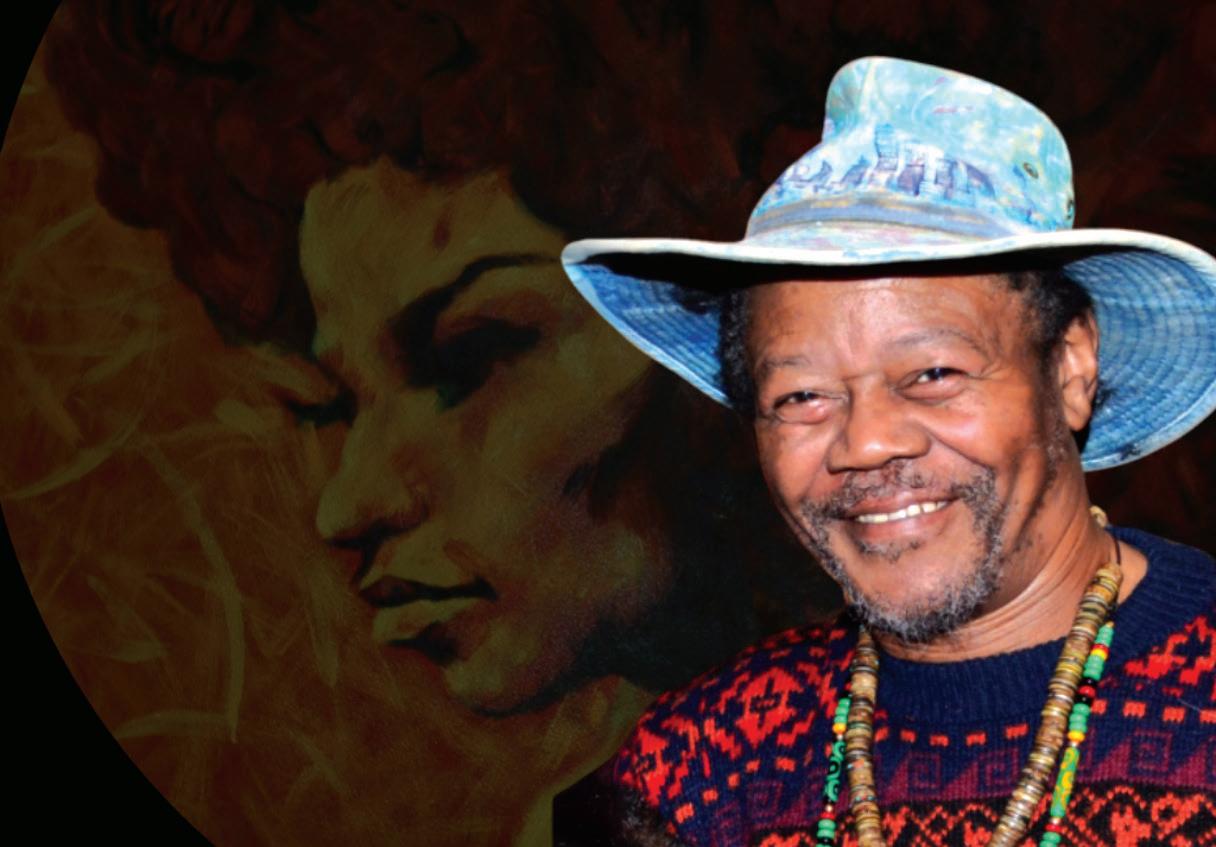

The Jacob Lawrence Gallery welcomes new director Jordan Jones
FRESH FROM NEW YORK, Jordan Jones, an artist and curator, arrived in Seattle this spring to join the Jacob Lawrence Gallery as its director and curator. Most recently, she was exhibitions coordinator at Independent Curators International, a small nonprofit that supports curators who don’t have a home organization or museum. She has also been a curatorial fellow at the Studio Museum in Harlem and The Museum of Modern Art. “I had amazing projects and from my base in New York was able to work with communities and institutions across the globe,” she says.
Based in New York for the past five years allowed her to be close to home and work on both small and large projects. “It was a great training ground,” Jones says. Some of her projects brought her in contact with university museums and galleries. “I was amazed at the sense of community formed around those art spaces,” she says. “I wanted that for myself.”
When Jones saw the opportunity to work at the UW’s gallery named for Jacob Lawrence, “a lot of things aligned for me,” she says. “It is an amazing university space, and I really like its focus on social justice, education and experimentation.”
Jordan arrived on campus just in time for the Jacob Lawrence Legacy Residency exhibition, featuring 2024 resident Simon Benjamin. The residency is a signature program of the gallery that invites Black artists at all stages of their careers to spend up to four weeks at the UW developing and exhibiting new work. Benjamin, a Jamaican multidisciplinary artist and filmmaker based in New York, spent three weeks on campus in March and April. During his stay, he used the gallery as a studio space and engaged students in his creative process.

SEEKING TO RECOGNIZE young alumni for their engagement with the UW and their work supporting communities, the Office of Minority Affairs & Diversity has created a Spark Award.
The first-ever recipient is Mariama Suwaneh, ’17. A student leader and community builder, Suwaneh embodies the diversity, equity and inclusion leadership that inspires young change-makers and exemplifies the spirit of the Charles E. Odegaard award, which was created in in 1968, the highest achievement in diversity at the UW.
In their letter supporting Suwaneh’s nomination, leaders from the Multicultural Alumni Partnership wrote: “Mariama has dedicated her life to racial reconciliation and demonstrates the heart of a Husky in every way. We are excited to celebrate and recognize her immense accomplishments and impact by nominating her for the inaugural Spark Award.”
After graduation, she went to work for Year Up, a nonprofit workforce development organization. Then she returned to the UW to work in development, raising money to expand the Black Graduation events and exploring ways to integrate more diversity, equity and inclusion components into annual fundraising. She was the first learning and development specialist for University Advancement.
She was the first director of equity, diversity and inclusion at the nonprofit Hopelink, as well as a diversity, equity and inclusion community manager at Seattle law firm Davis Wright Tremaine. Today, Suwaneh is the assistant director of the city of Tacoma’s Office of Equity and Human Rights. And for the past five years, she has volunteered on the board of the UW Multicultural Alumni Partnership.

Suwaneh’s work has centered on bringing people together to find common ground, build experiences and share knowledge. “Yes, I change systems, but for me, it’s about changing the hearts of people,” says Suwaneh. “We can have broken systems, but if people didn’t want them to be that way, then they wouldn’t be.”
As a student, Suwaneh served on the Black Student Union Board of Directors, the UW Race and Equity Steering Committee, the UW’s Black Campus Ministries and the ASUW as the Black Student Commissioner. She helped bring speakers to campus, advocated for a new fund for social justice programming and provided support for other Black student organizations.
In addition to her UW political science degree, she holds a master’s in social science from the University of Chicago.
“We often talk about how inspirational emerging leaders can be. Mariama not only inspires her mentees and those who have served in campus student leadership after her, but she is an inspiration to many who have been in this field for some time,” says Rickey Hall, Vice President for OMA&D and University Diversity Officer. “We are incredibly proud to be honoring her.”
On May 15, the Office of Minority Affairs & Diversity and its Friends of the Educational Opportunity Program Board will present Suwaneh with the Spark Award at the annual Celebration Gala.
IN MARCH, filmmaker Nuk Suwanchote, ’17, debuted “Horizon Identities: Students’ journeys at UWT,” a new documentary exploring the Asian American and Pacific Islander student experience at the UW’s southernmost campus. Nearly one in four UW Tacoma students is Asian American or Hawaiian/Pacific Islander. The 30-minute film shares some of their stories and how their college journeys have shaped their friendships and their futures. Suwanchote and his team featured current and former students as well as faculty and campus leaders.
The film was produced by the Chinese Reconciliation Project Foundation, a local nonprofit that recognizes the 1885 event when, in a wave of anti-Chinese sentiment, Tacoma city leaders and community members forcefully expelled the city’s Chinese people. Today, with the mission of promoting civic harmony, the foundation celebrates the diverse, multicultural city Tacoma has become.
The UW's Leadership Without Borders program helps undocumented students step out of the shadows.
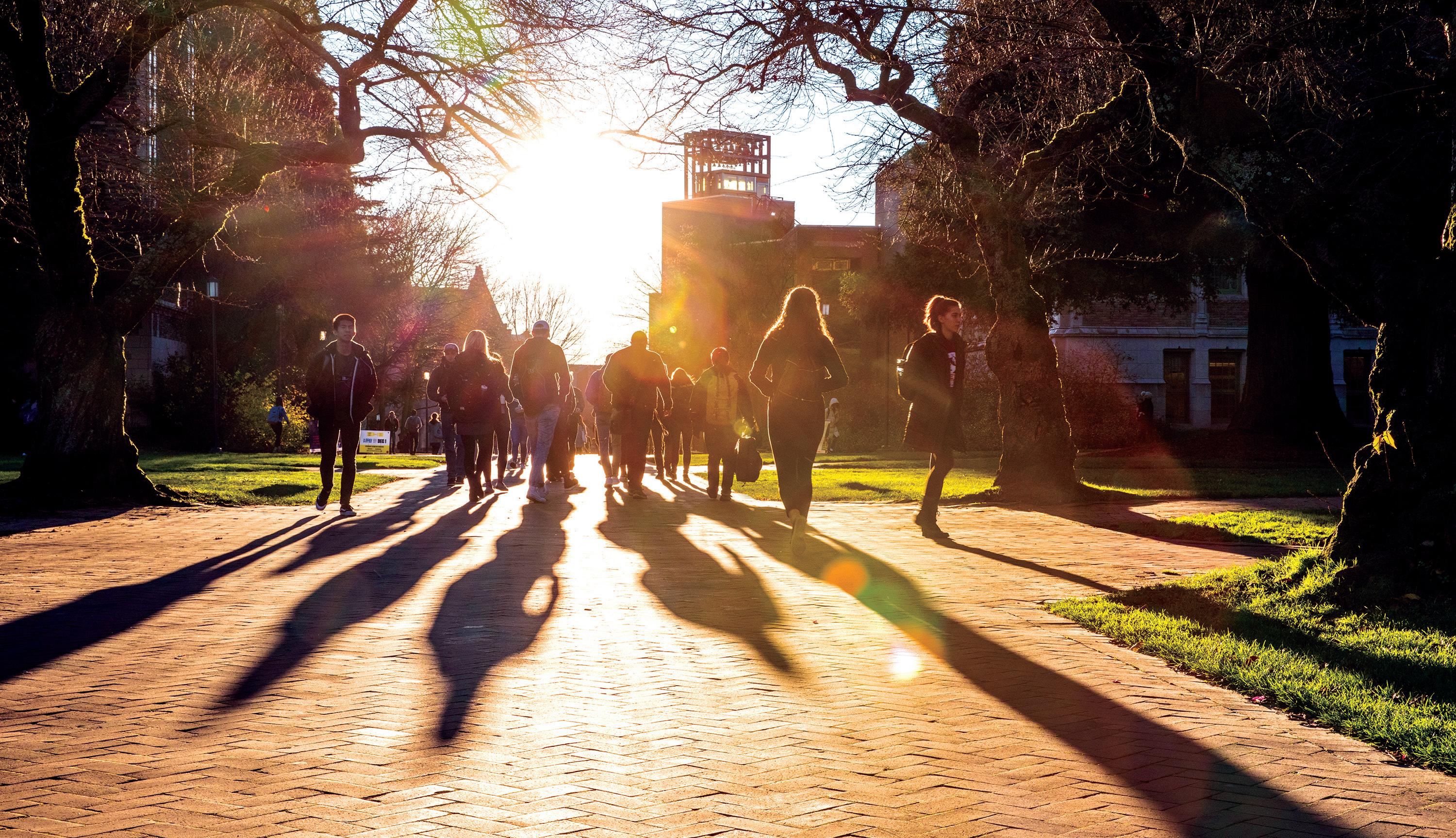
LeadershipBy Caitlin Klask
WHEN YOU’RE an undocumented student, nearly every step of your college journey is a challenge.
Juggling essays, transcripts, financial aid, school tours and choosing a major, you’re also navigating immigration policies and risking exposing your citizenship status. It’s a time when students need a resource, and 10 years ago, the UW’s Leadership Without Borders program formed to fill that need.
Located in the Samuel E. Kelly Ethnic and Cultural Center, Leadership Without Borders educates students on systemic barriers while providing basic resources like textbooks through the Husky Lending Library. But they also provide a simple necessity: A safe space. “When you walked into an office on campus, you never knew if you were able to feel welcome,” says Yuriana Garcia Tellez, ’18, who served for nearly three years as the Leadership Without Borders coordinator at the UW and now works in talent acquisition for Netflix. “Professors had no idea about our student experience. We were closeted. But I would talk to anybody who would listen about how we were under-resourced.”
“The toughest thing at the UW is finding a community,” says Dr. Carlos Estrada Alamo, ’11, who came to the UW as an undocumented student before Leadership Without Borders existed. He found academic support from his departmental advisors and the Office of Minority Affairs & Diversity Instructional Center—part of the UW’s Educational Opportunity Program, but
otherwise, resources for undocumented students were scarce.
Estrada Alamo, now an anesthesiologist at Virginia Mason hospital, remembers looking for financial aid advice and coming up empty. “Even if there was an answer about a question you had, it was often not applicable to you,” he says. “Or there’s this big asterisk about these ten extra things you had to do in order to even be considered.” He eventually found help from fellow undocumented applicants on internet forums. Fortunately, he was chosen for a Costco Diversity Scholarship. “The scholarship signified to me that I was welcome, that they wanted me there. So I attended the UW,” he says.
Having a resource like Leadership Without Borders “is important—to find community, to be seen, to be heard, to be understood. It goes a long way,” says Hugo Garcia Villa, the program manager. “When you build community, you build networks and relationships. A lot of the time, you don’t find that in a big institution like the UW.”
Immigration status has been used as a tool for political power, resulting in systemic policy barriers, like preventing undocumented students from receiving federal aid. The Trump Administration, for example, sought to repeal the Deferred Action for Childhood Arrivals policy (DACA) despite the overall positive impact of the program on immigrants and native-born Americans, Garcia Villa says.
“There have been a lot of political efforts to dismantle and terminate DACA,” says Garcia Villa.
“What kind of repercussions would that have? Think about how many DACA recipients are working in the health-care industry.” According to the American Medical Association, it’s about 30,000.
In 2003, Washington’s legislature approved HB 1079, which allows elegible undocumented students to be considered as state residents for purposes of higher education. In the wake of the legislation, UW staff and students created Leadership Without Boarders to help with a range of needs and experiences including financial literacy, considering graduate school, finding scholarships and understanding landlord/tenant rights.
As someone who advocates for a better future for undocumented immigrants, Garcia Villa encourages UW departments to take the next step. “Maybe it’s changing the language on scholarship requirements,” he says. “Maybe it’s looking at your website and finding out how you can be more inclusive and intentional. Maybe it’s creating internship opportunities for students who usually don’t qualify.”
He invites those who work in higher education or community organizations to attend the programs’ Undocu Ally trainings. They were first created to provide guidance to UW faculty and staff on how to be more supportive to their undocumented students.
“But the work doesn’t stop there just because you say you’re an ally,” he says. “It’s about implementation. What are you actively doing? How are you an accomplice of social justice?”
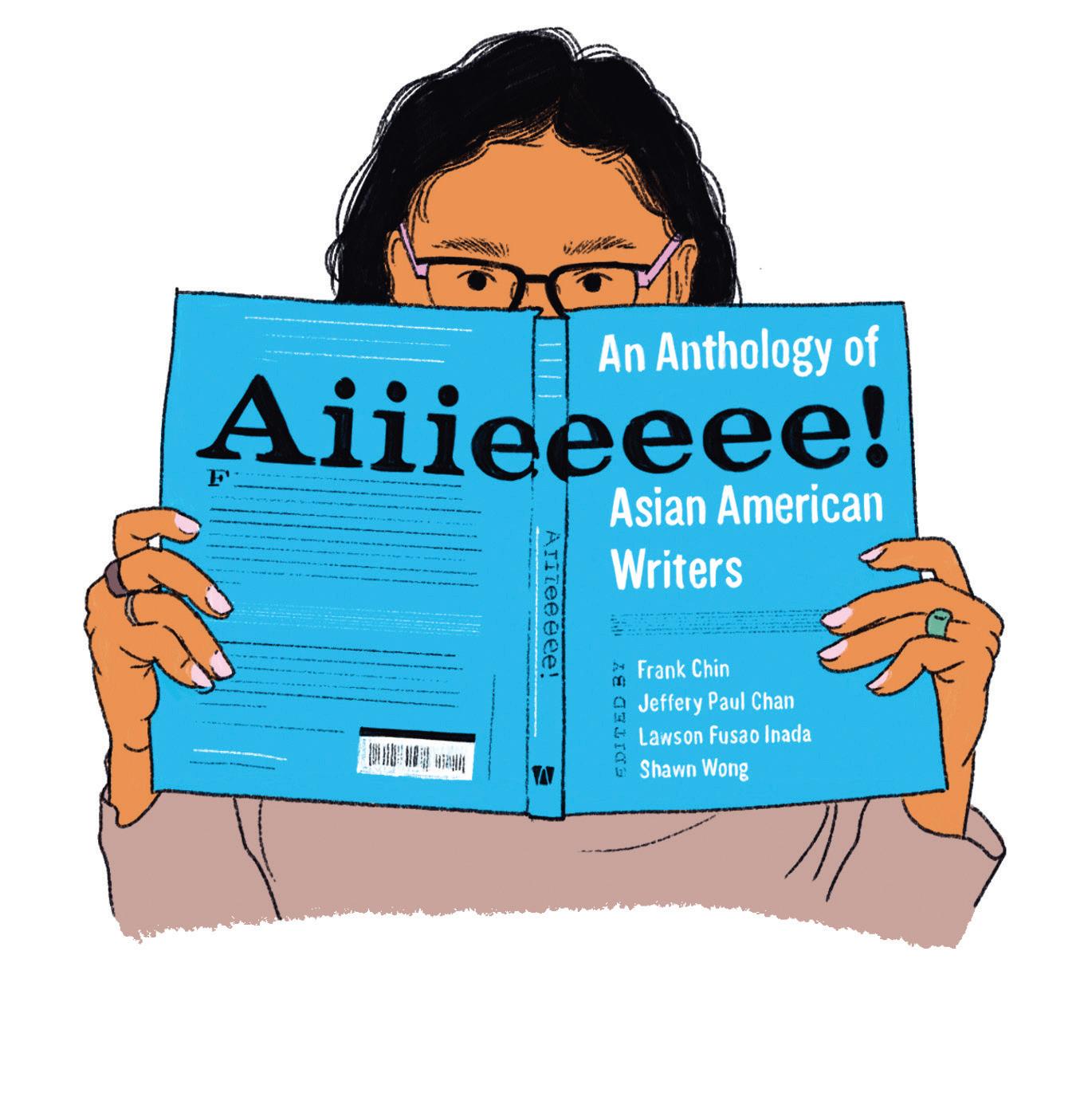 by Shin Yu Pai • illustrations by Julia Kuo
by Shin Yu Pai • illustrations by Julia Kuo
UW
Press celebrates “Aiiieeeee!” and a 50-year legacy of Asian American literature
IN 1970, when Shawn Wong was 19 and a student at the University of California at Berkeley, he had to go hunting for Asian American literature on the street.
An English professor told him no such literature existed. But Wong and his friends and fellow writers, Jeffery Paul Chan, Frank Chin and Lawson Fusao Inada, knew that wasn't true. They had connected over a shared quest to discover Asian American literature. Their dogged search through Bay Area thrift stores and a handful of literary anthologies led them to 14 writers whose work had been largely ignored by mainstream publishers.

“Our place in history will have the secure feel of real beginnings. After a while, people will refer to us as the fathers … the cornerstones of our culture.”
As the young editors continued to refine their list of work by overlooked authors, they decided to create an anthology. Chan brought their fledgling manuscript into the Asian American literature class he was teaching at San Francisco State University, while Wong—who would later join the faculty at the UW—used the material in a class he was teaching at Mills College in nearby Oakland. Eventually, the first-time editors published that group of 14 authors, which included UW alumnus John Okada, ’47, ’51, as well as now well-known wordsmiths Toshio Mori, Oscar Peñaranda and Diana Chang. Their radical undertaking culminated in “Aiiieeeee! An Anthology of AsianAmerican Writers.”
This year, “Aiiieeeee!” turns 50. First published by the Howard University Press in 1974, the book was republished in 2019 by the University of Washington Press. The new edition holds a foreword by Tara Fickle, associate professor of Asian American studies at Northwestern University, who offers the current generation of readers context about the era and people involved in bringing the book to life. Fickle studied Wong’s correspondence with the writers and his fellow editors. She also looked at the production notes for the book to understand

LAWSON FUSAO INADA
how the collection evolved through the editorial process and what the stakes were for the editors. Fickle’s research into Wong’s archives unearthed the editors’ own reflections on their project. In a letter to Wong, for example, Inada envisioned the anthology’s success. “Our place in history will have the secure feel of real beginnings. After a while, people will refer to us as the fathers … the cornerstones of our culture.”
Inada’s words held true. “Aiiieeeee!” became a foundational text in Asian American Literature, and its editors were credited for both rescuing stories out of time and opening readers to a diversity of voices and experiences from the Asian American community. The anthology’s 14 pieces range from the 1940s to the 1970s, ending in a time when activists and scholars were challenging stereotypical representations and expectations of the Asian American voice and experience to highlight neglected perspectives and more freshly define the culture.
Author and activist Ishmael Reed helped the four writers and would-be editors find their way to the Howard University Press.
The Howard editors “were the first to realize the legitimacy of Asian American literature,” Wong says. “It was one of the first 10 books on their list. And it was the only one that wasn’t an African American title.”
Reed dubbed Wong and his friends the “Four Horsemen of Asian-American Literature” and encouraged their efforts to provoke, develop and define an Asian American literary canon. Right away, the book garnered positive reviews in Rolling Stone and The New York Times and advanced Wong and his collaborators along their paths as writers and literary activists.
Today, the UW is steeped in the legacy of their groundbreaking work. A wealth of modern Asian American literary voices includes UW alumni and scholars who studied Asian American literature, English literature and ethnic cultural studies.
Wong joined the UW faculty in 1984, after teaching at Mills College, UC Santa Cruz and San Francisco State. He is currently a professor in the English department and has served as chair of English, director of the Creative Writing Program, director of the University Honors Program and faculty in Cinema & Media Studies.
“The UW has always been a place where you can reinvent yourself,” says Wong. “It’s

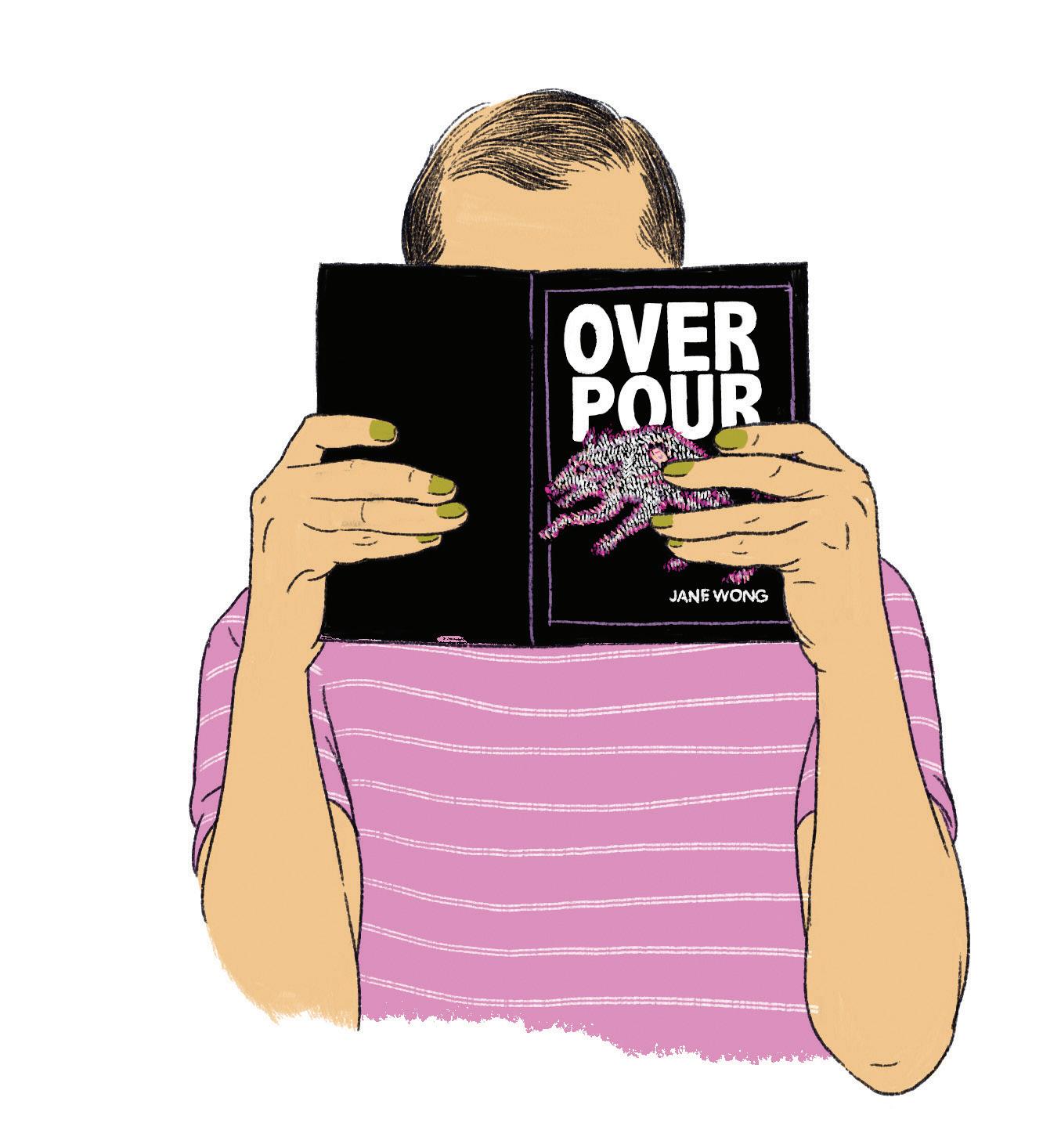
large enough that I could try different things and bring my perspective to lots of different fields.”
Alongside Wong’s legacy, the University of Washington Press has its own long history of engaging contemporary scholars in republishing and recontextualizing Asian American classics for new generations of readers. It also has a long-standing commitment to supporting Asian American scholarship dating to the early 1970s when editor-in-chief Naomi Pascale saw an opportunity to position the press at the forefront of the discipline. In 1973, the press republished Filipino novelist Carlos Bulosan’s “America Is in the Heart.” Over her decades-long career at the UW Press, Pascale acquired many other titles in this area, including Jade Snow Wong’s “Fifth Chinese Daughter” and Janice Mirikitani’s “Awake in the River and Shedding Silence.”
When Nicole Mitchell became publisher of the press in 2012, she led the redesign and refresh of its Asian American classics series and invited contemporary writers and scholars to develop introductions for these new editions. The UW Press also has published titles from UW faculty across disciplines. “Becoming Nisei,” by professors Lisa Hoffman in the School of Urban Studies and Mary Hanneman, ’91, of the School of Interdisciplinary Arts and Sciences, looks at Japanese Americans in Tacoma before World War II. Professor Stephen Sumida’s “And the View from the Shore” explores the literary traditions of Hawai'i.
The press also has supported prominent Northwest-based Asian American writers including Frank Abe, Peter Bacho, ’74, and Cindy Domingo.
In 2020, Shawn Wong established the Shawn Wong Book Fund at the UW Press to recover forgotten titles, like Louis Chu’s “Eat a Bowl of Tea,” and bring them back into print for the wider public. The newest title in Wong’s series is Willyce Kim’s “Dancer Dawkins and the California Kid”—the first Asian American lesbian novel.
Rising scholars and talented writers are drawn to the UW’s English Ph.D. program. Poet and writer E.J. Koh, ’23, won the Washington State Book Award for her memoir, “The Magical Language of Others.” Her novel, “The Liberators,” was released last fall. At the UW, Koh studied Korean American literature, history and film. Rita Banerjee’s, ’06, recent contemplation on female cool, “The Female Gaze,” was published in “The Best American Essays” last year. And in her new memoir, “Meet Me Tonight in Atlantic City,” Jane Wong, ’16, writes of finding in the literature of other Asian American artists ways to tell her own story.
Edmond Chang, ’12, an associate professor of English at Ohio University, describes his time in UW’s English Department as one of the most formative and generative. “I looked to my peers, mentors and faculty of color not only for community and guidance, but more importantly, for showing me that it could be done. That I could belong and succeed in the classroom, the profession and in the world,” he says. “Now, as a queer Asian writer, scholar, mentor and tenured professor, I try to honor the trails they blazed and to try to create a few of my own.”
“ ‘Aiiieeeee!’ was entirely unique in emphasizing the political potential of Asian American literature, and this is why we’re still talking about it today.”
TARA FICKLE
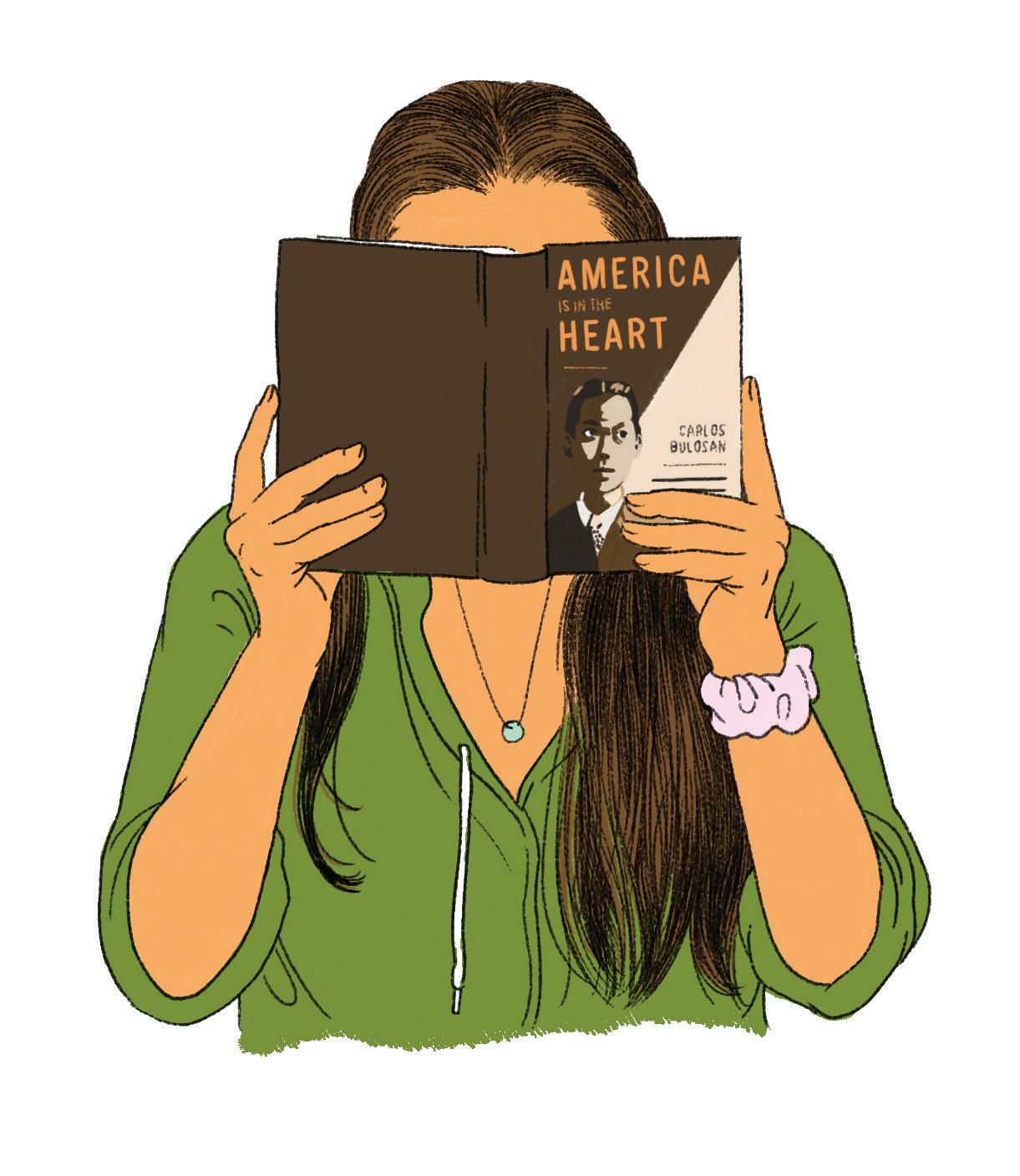
Despite receiving positive reviews upon its release, “Aiiieeeee!” drew detractors. The book was criticized for neglecting women authors and for narrowly defining Asian Americans as those of Japanese, Chinese or Filipino descent, leaving out a world of Asian backgrounds including Korean, Native Hawaiian, Pacific Islander, Indian and Vietnamese. It has also come under fire for a masculine bravado in the editors’ essays. Tara Fickle addressed the critiques in her forward. “The Preface was a manifesto for Asian American literature. In that sense, it can be read as emblematic of its times and the 1960s and 70s Civil Rights and Anti-War movements which the editors were involved with,” she writes.
Today is a new day for underrepresented voices, and Asian American literature is flourishing with fresh new voices. The UW’s legacy of hiring Asian American studies faculty like Douglas Ishii, Michelle Liu, Vince Schweitler, Chandan Reddy and Caroline Simpson have contributed to shaping two generations of writers, scholars and teachers. “There’s definitely a large cohort of Asian American scholars at the UW,” says Wong. “If you have Asian American professors teaching in your program, you’ll produce more Asian American Ph.D. candidates.”
In April, the UW Press celebrated the past and future of Asian American literature at a program at Seattle Public Library by showcasing “Aiiieeeee!,” the press’s Classics of Asian American Literature series and books made possible by the Shawn Wong Book Fund. The program will feature Shawn Wong, Eunsong Kim, Bay Area writer Willyce Kim, and poets Yanyi and ChingIn Chen, an associate professor at UW Bothell.
Today “Aiiieeeee!,” is required reading in literature programs
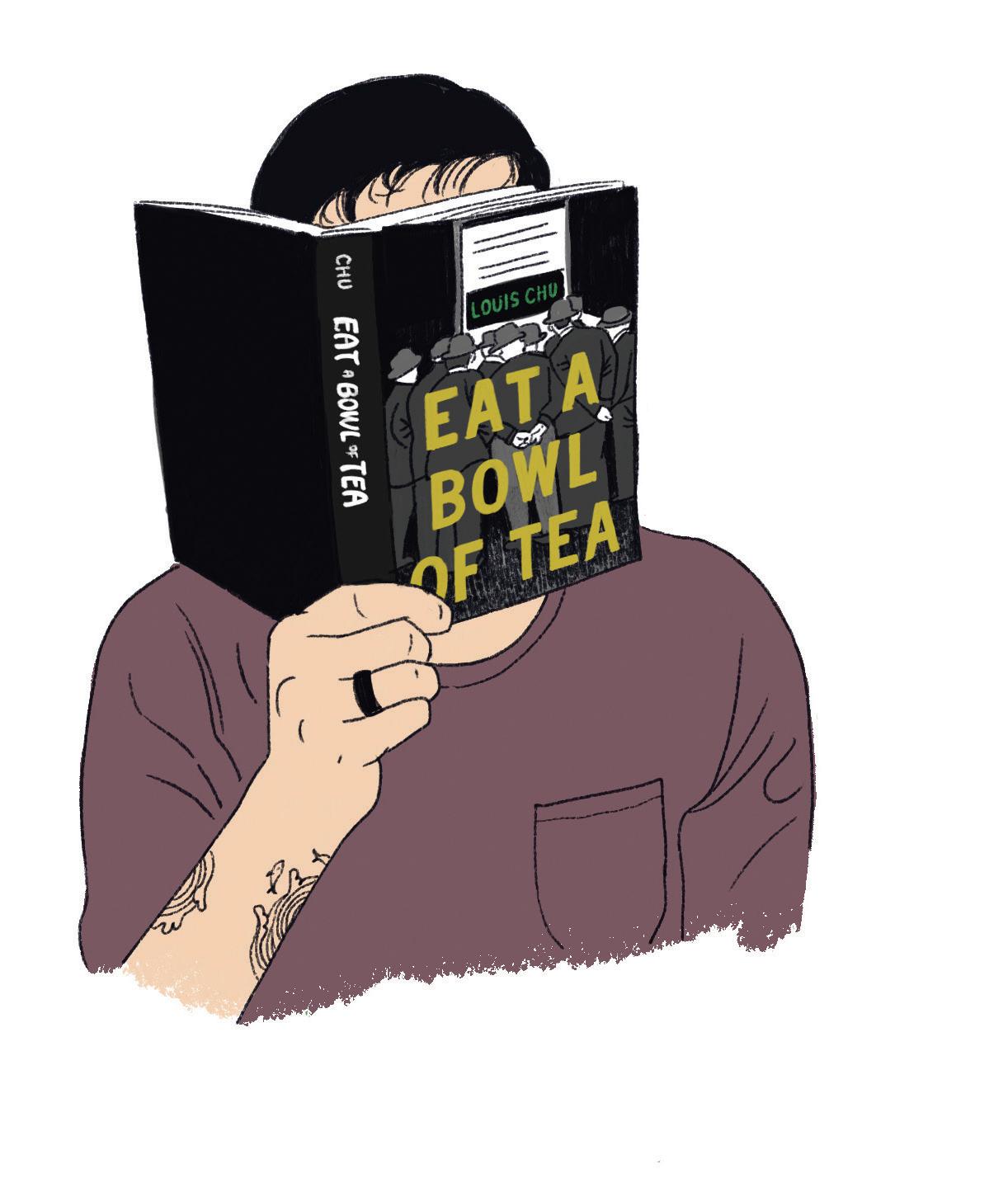
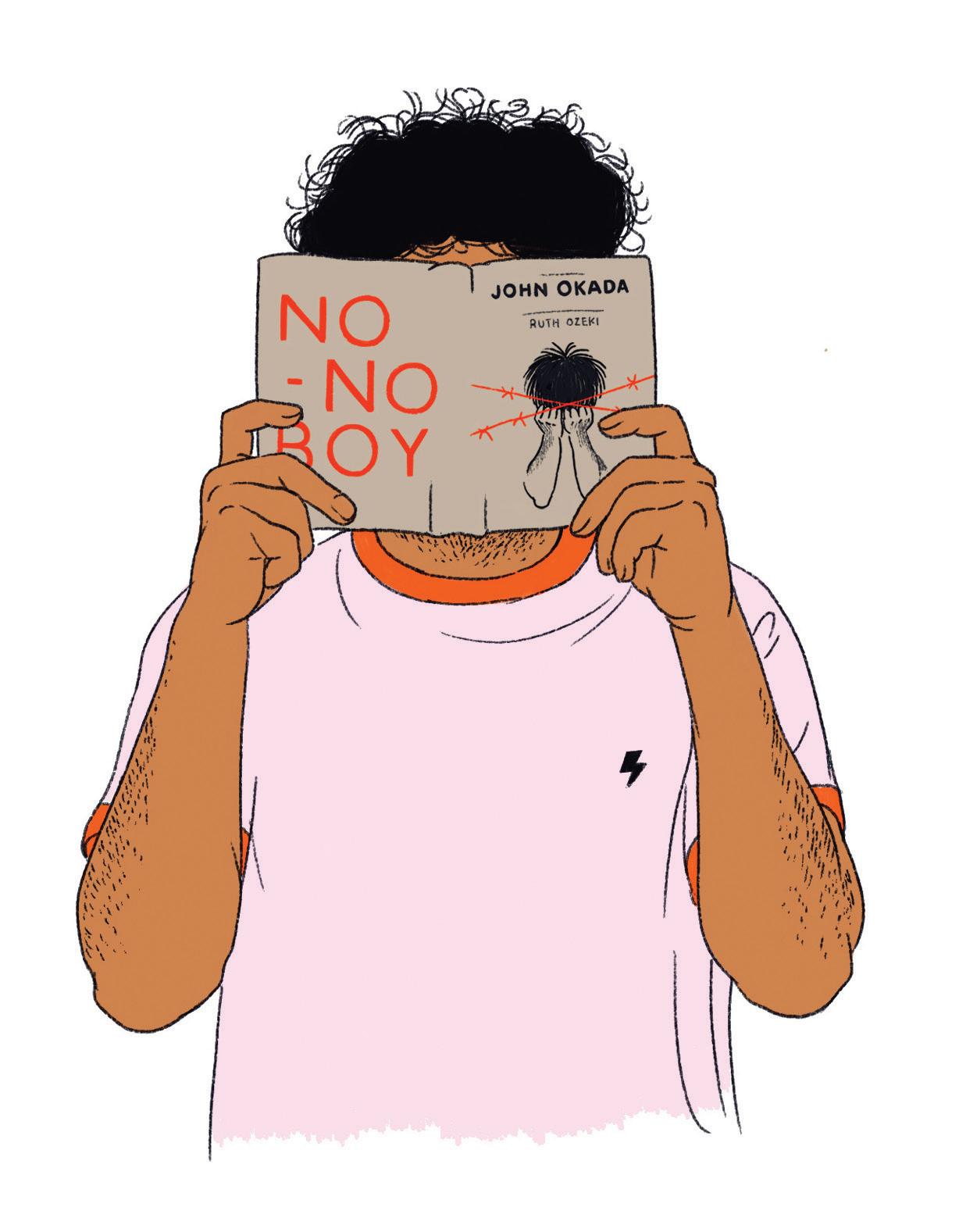
around the country. By creating the anthology, the editors nourished a burgeoning literary movement. “‘Aiiieeeee!’ was entirely unique in emphasizing the political potential of Asian American literature, and this is why we’re still talking about it today,” says Fickle. “Alongside its contemporaries and predecessors in African American, Chicano/a, and Native American literature, ‘Aiiieeeee!’ is a testament to how the uplifting of marginalized artistic voices has the power to shape the publishing landscape for generations of writers to come.”
The Last Story of Mina Lee: Bringing readers to Seattle and Los Angeles, Nancy Jooyoun Kim, ’06, crafts a New York Times best-selling novel.
Uncle Rico's Encore: Law alum Peter Bacho, ’74, ’81, tells “Mostly True Stories of Filippino Seattle.”
Echo in Four Beats: Through her book of poetry, MFA alum Rita Banerjee, ’06, offers a fresh take on the myth of Echo and Narcissus.
Meet Me Tonight in Atlantic City: Jane Wong, ’06, a poet, associate professor and memoirist, digs into her East Coast childhood.
Should You Lose All Reason(s): MFA alum Justine Chan, ’15, releases her first book of poetry to wide acclaim.
The Liberators: Poet and author E.J. Koh’s, ’23, debut novel comes on the heels of both her doctorate and her memoir, which won the Washington State Book Award.
Gearbreakers: Zoe Hana Mikuta, a UW undergraduate, sets her popular young adult science fiction novel in a dystopian future.
Stamped: an anti-travel novel: Kawika Guillermo, who completed a Ph.D. in 2013, is a novelist and short story writer whose book has been adapted into a video game.
The Loved Ones: Sonya Chung, ’98, has turned her MFA into a career in teaching and writing novels that journey through generations and cultures.
Apology Engine: MFA alum Cameron Quan Louie, ’17, won the 2017 McLeod-Grobe Prize for Poetry. His latest, a prose poem, explores moral responsibility.
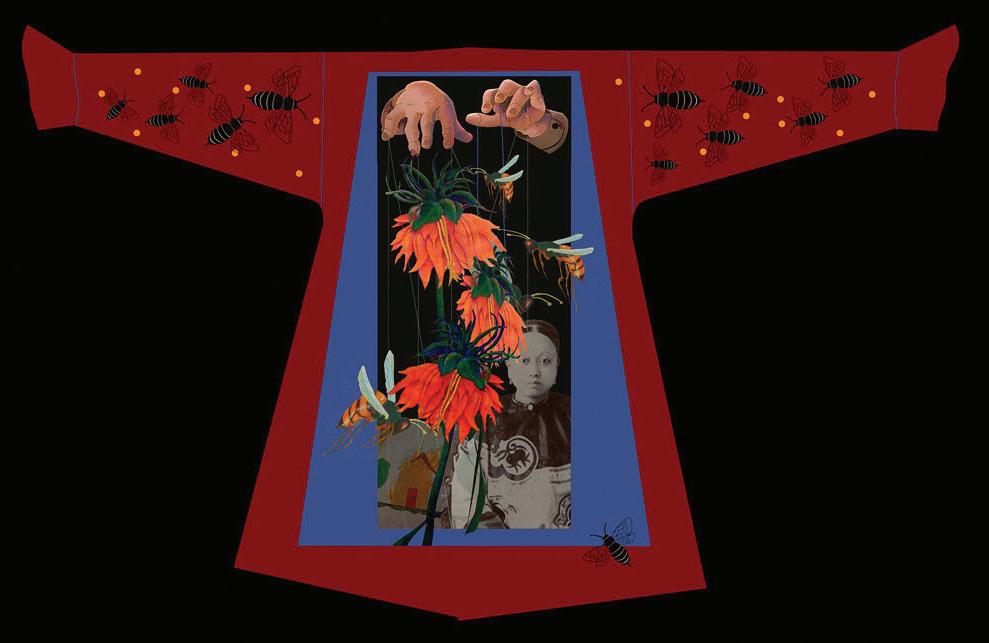 By Shin Yu Pai
By Shin Yu Pai
CHERYLL LEO-GWIN, ’75, ’77, grew up in a home filled with dress forms, fabrics and clothing, trappings of her mother’s work as a designer of bespoke apparel. Her mother had dropped out of school at age 13 to earn money designing clothes, believing that her professional opportunities would be limited by the Canadian Exclusion Act that discriminated against the Chinese. Later, when the family relocated to Seattle, her mother continued to make custom clothes for the local elite.
“Subconsciously, I started using the dress form,” LeoGwin says of her artwork. “Clothing embodies the personality and the desires of the women who wear them.”
‘Puppet Master,’ left, and ‘Eureka! Chinatown,’ below, are inkjet prints on archival paper. Using images from her own sculpture and painting as well as photographs, Leo-Gwin touches on themes of social justice and public counciousness.
Leo-Gwin’s passion for Chinese women’s histories is rooted in the exclusion of their stories from the public and historic record over 5,000 years in China as well as more recently in the United States. “We know about the railroad workers and miners, but we know nothing about the women,” she says. “Women’s births, marriages and deaths were not written down. So, I want to bring some of those stories to the surface, so they are not forgotten.”
Leo-Gwin started at the UW taking night classes, working during the day and freelancing illustrations in her spare time. She finished her MFA in one of the few coveted spots in metalsmithing and jewelry.
Her latest public art project, “Oracle Bones,” was commissioned by the Wing Luke Museum in 2023. It stands outside of the former Immigration Naturalization Services building in the Chinatown-International District. Creating the commemorative artwork, Leo-Gwin reflected on the stories that she heard as a child from her Japanese neighbors who had been forced into incarceration camps during World War II.
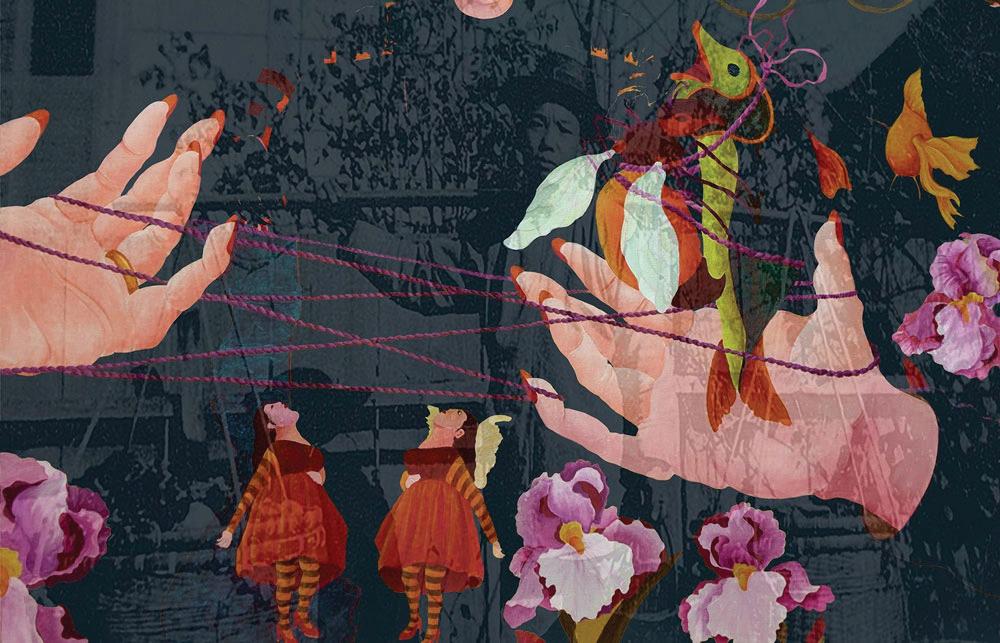

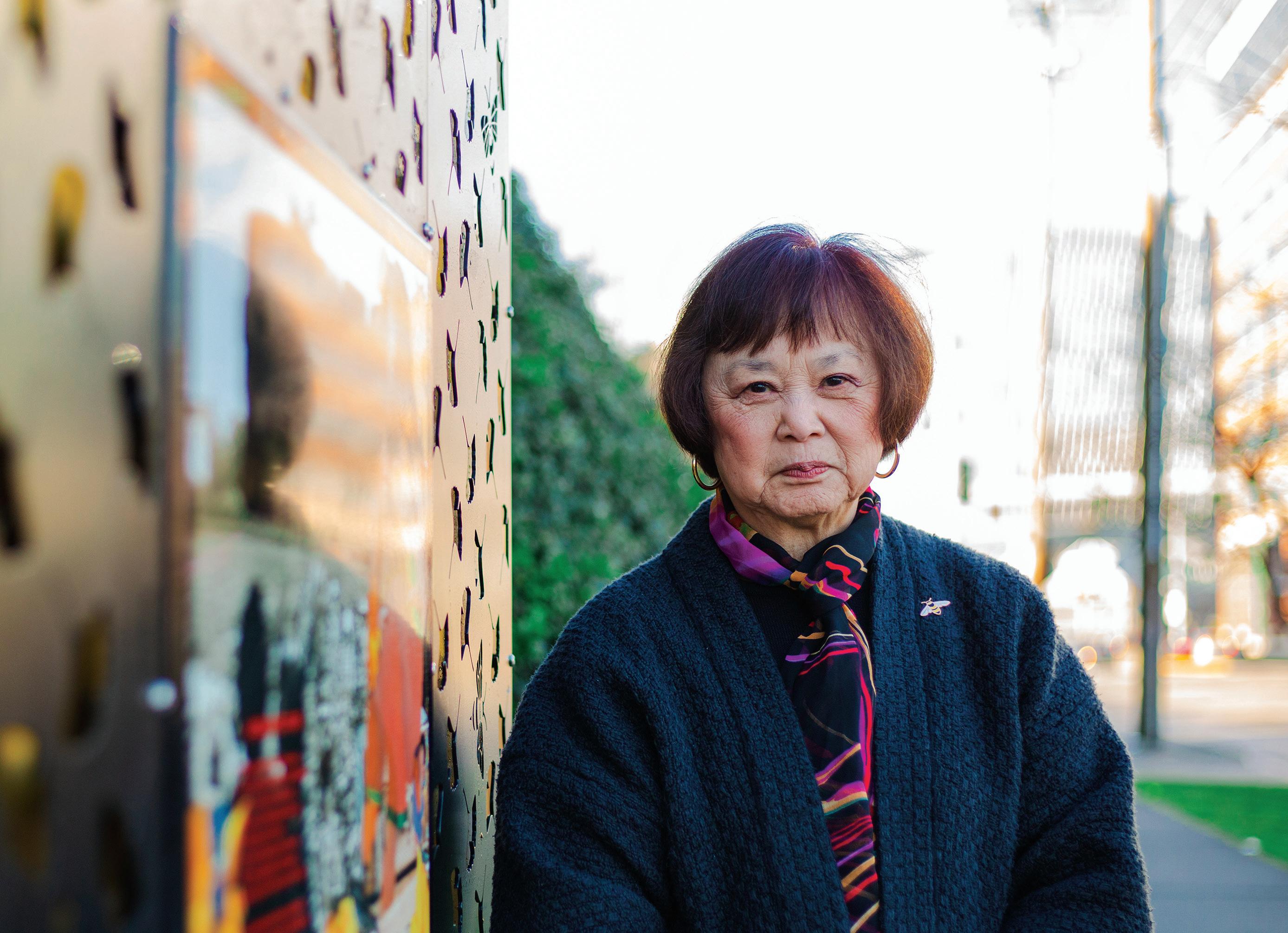
The Seattle artist examines history and identity in her journey from student to public artist

The podcast ‘Identity Unboxed’ serves up unfiltered life lessons and business insights from successful Black professionals
By Nancy JosephIN THE PAST YEAR, Tiana Cole, ’21, and Brad Blackburn III, ’21, ’23, have spoken with Black civic leaders, broadcasters, business owners, educators, nonprofit directors and other successful professionals about their careers—including how race has factored into their journeys. Their unfiltered conversations are now streaming on “Identity Unboxed,” a podcast they
launched in 2023. Cole, who majored in journalism and public interest communication, and Blackburn, who majored in political science and completed a master’s degree in public affairs, created the podcast as a resource for young Black professionals. They see it as an opportunity to learn from established professionals who have been through a similar journey.
“We’ve met so many exceptional people who have inspired us and helped us along the way on our own journeys,” Cole says. “We thought a podcast would be a great way to learn how they’ve gotten to where they are and provide those stories of inspiration and resilience.”
Blackburn and Cole met as students at Tumwater High School. Both came to the
UW with plans to pursue health-related majors, convinced that would ensure stable and lucrative careers. They quickly realized their interests lay elsewhere. Cole discovered a passion for journalism and storytelling. Blackburn’s interest in social justice led to courses in political science, public administration and law, societies and justice.
The two alums recently started their professional journeys—Cole as a program administrator in the UW’s Continuum College, Blackburn as community engagement and inkind manager at YouthCare, a Seattle nonprofit. Their podcast has already helped them on their own journeys.
“I was going through a tough life transition when we started the podcast,” Blackburn says. “To hear from professionals who had gone through the same things was really a guiding force. Even now, if I’m struggling with something at work, I’ll go back to an episode and listen again. That’s the joy of this podcast. We’re reaping the benefit of our mission, getting that mentorship. We hope other folks are as well.”
The hosts have a long list of potential guests for “Identity Unboxed” in 2024. They look forward to highlighting careers not covered in previous episodes, such as engineering and medicine. All guests are local to the Seattle area, by design. “That’s been a priority for us,” Cole says. “Seattle doesn’t have the most visible Black community, so we felt it was important to show that there are Black professionals here and they’re successful. We look for folks who have been through adversity and reached a position where they can shed light on their experiences.”
Another factor is the podcast’s authenticity: The in-depth conversations are not heavily edited. Most are an hour or longer, covering everything from childhood experiences to professional crossroads. Guests discuss moments of self-doubt and moments of clarity and confidence. “We really get into the intersection of their personal and professional lives, and how their identity has influenced their decisions,” says Cole.
While most podcast listeners are Black, the hosts “want this to be a learning space for non-Black people so they can hear our unfiltered conversations and learn how to show up better as allies in professional spaces,” Blackburn says. “Everyone is welcome.”
Each year, the Multicultural Alumni Partnership reaches out to to historically underrepresented UW students with financial support. The promising scholars who were granted awards in late 2023 range from early undergraduates
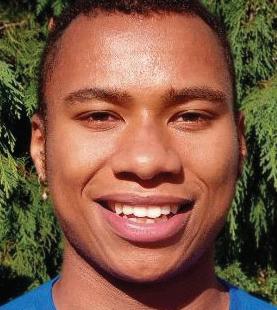
Since 1994, alumni and friends in the Multicultural Alumni Partnership have worked together to promote diversity at the UW and address issues of equity and diversity on our campuses and in our community. �hey do this through mentoring, supporting lectures, networking in the community and providing scholarships.
A first-year doctor of physical therapy student in the Department of Rehabilitation Medicine, John Williams Jr is the first of three children born to parents with African American, Native American and Caucasian ancestry. Growing up, he experienced housing instability and had parent facing a significant health issue. “I know firsthand how harsh the world can seem,” he says. “Witnessing something compassionate makes the world seem like a better place, and doing something compassionate actually makes the world a better place.” Drs Lois Price Spratlen and Thaddeus Spratlen Scholar
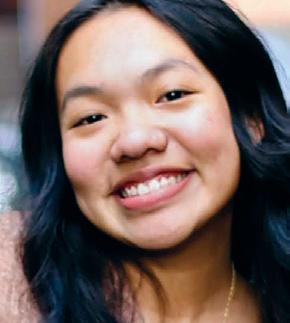
A first-generation student with Hispanic and Vietnamese immigrant Parents, Kristina Montero-Duong is studying social welfare and intends to minor in diversity and human rights. Her parents, who never reached high school for economic reasons, stressed the importance of attending college. “My family and I faced many economic and social barriers,” she says, but social workers supported them by “translating, offering job training and guiding us to better resources.” Now her passion is working with families and children. “Everyone deserves a fair chance to succeed regardless of their background or cirumstances,” she says. “I am committed to making a positive impact on the world around me.”

El Cruz Lara is a junior studying medical anthropology and hoping to become a professor and researcher. They want to be a voice for people who may not have received this scholarship but are clearly in need.
“We live in a system where students on financial aid have to spill their darkest secrets to be considered for an education,” they say. “Many bright individuals, including those my family, will never have access to education.” Lara believes every one de-
serves an education, but not everyone can pursue one because of systemic inequity. There is excitement when individuals from marginalized groups can get out of poverty because it seen as overcoming the odds. Scholarships help close this gap, but "I would like everyone to know we shouldn’t shield our eyes and think that this is enough to help bridge this gap," they say. “I hope someone reading this will understand more about why we need to work on bridging the gap in education, if only a little,” Lara says.
Alfredo Arreguín Scholar
A first-generation college graduate, YasminGarfias earned a B.A. in psychology in 2021. She worked with members of the RISE Mental Health lab under Dr. Shannon Dorsey to research equity in community mental health and evidencebased treatments for children and adolescents. The experience deepend her understanding of equitable care and the importance of cultural awareness. She is currently pursuing a master’s in special education with an emphasis on applied behavior analysis (ABA). which combines her interests in psychology and her desire help others. Growing up, she was aware of the historical and cultural burdens her family carried as Mexican and Indigenous Americans. “Their experiences fueled my desire to contribute to a more inclusive and equitable environment while supporting individuals through ABA,” she says. Owen G. Lee Scholar

Now in her first-year in the UW School of Public Health’s global health program, Dale, ’23, was drawn to the field by her multicultural background, a blend of Kenyan, Korean and British heritage, and her experiences witnessing inequities in the US and abroad. A first-generation student and a single mother, she has had to be resilient and ready for challenges. As an undergraduate, she co-founded an association for nontraditional students to provide support for students facing challenges similar to her. She also mentors other students of color. “My passions within the realm of global health are centered on maternal and child health, as well as nutrition, with a deep-seated belief that these
 By Shin Yu Pai
By Shin Yu Pai
RASHEENA FOUNTAIN’S new memoir, “Starfish Blues,” grew out of her graduate thesis and explores her journey as a Black queer woman and her relationships to place and nature. The collection includes personal essays, gospel hymns and blues poems that reflect on the creative writing MFA alum’s experiences working in the environmental movement in Seattle while making sense of her relationship to the urban landscape of her childhood.
Born and raised on the west side of Chicago, Fountain, ’21, grew up in a community grappling with redlining, gun violence and municipal disinvestment. As a single mother, she felt compelled to leave her home community and move her young daughter to a place where they could thrive.
“Birth home is not always that place for many reasons, for many BIPOC,” Fountain says. “Land is both welcoming at its core while also being complicated.” Fountain’s own grandparents left the Mississippi Delta to move north where they hoped they could live better lives. That place of opportunity for Fountain and her daughter is the Pacific Northwest.
In 2016, the two settled in Seattle, and Fountain dug into career in nature conservation. Building on her degree in rhetoric as well as graduate studies in environmental science and sustainability at the University of Illinois Urbana-Champaign, she enrolled in Antioch University’s master’s program in urban environmental education. She also worked for nonprofits including the Audubon So-
Rasheena Fountain tells her story through letters, poems, memoir and nature writing
migration, exploration and relationships to nature and place.
ciety and the Environmental Leadership Program. But Fountain didn’t feel at home in the larger environmental movement.
So she turned her focus to literature. It “was the way that I was introduced to the concept of environmentalism,” Fountain says. Rachel Carson’s “Silent Spring” taught her about the effect of pollution on human health, particularly on marginalized communities. And literature was a gateway for Fountain to unlearn and relearn environmental perspectives. Books like Camille Dungy’s anthology, “Black Nature: Four Centuries of African American Nature Poetry,” gave her examples of Black poets celebrating the natural world. She counts poet Langston Hughes, writer Afaa Michael Weaver and Robert D. Bullard, who is considered the father of environmental justice, among her guiding lights. Fountain wants to create broader counternarratives to the mainstream environmental movement and to reflect a deep awareness of Black environmental thought.
Finding the UW’s creative writing program changed her life, Fountain says. Her adviser, Associate Professor Rae Paris, furthered her thoughts about environment, her place within it and solidarity among Black people and among Indigenous people.
“Working with Professor Paris further helped me see how my work
in Black environmental memory is inextricably linked with discussions of colonization, land sovereignty and more,” she says.
Now a doctoral student in English, Fountain continues to write essays and poetry. She also developed an audio-visual project, “Dropped Down Blues,” while in a marine science fieldwork course that allowed students to choose a site to observe, research and respond to with a creative project. Fountain has been a member the Black Embodiments Studio—an arts-writing incubator and public programming initiative founded by Associate Professor Kemi Adeyemi and dedicated to building discourse around contemporary Black art. “Being immersed in Black arts and arts writing heavily influences how I now engage with texts beyond the page and how I have sought to incorporate more of my art and my own art practice into my critical work,” Fountain says.
In bringing an environmental lens to her creative work, Fountain brings her full self and history into advocacy for the planet, other beings and people. “I am speaking to an audience that may not be reached by mainstream environmentalism, which is important,” Fountain says. “I hope my work is widening and welcoming our histories, family ways of being, and repairing ruptures to build a more collective movement in such urgent times.”
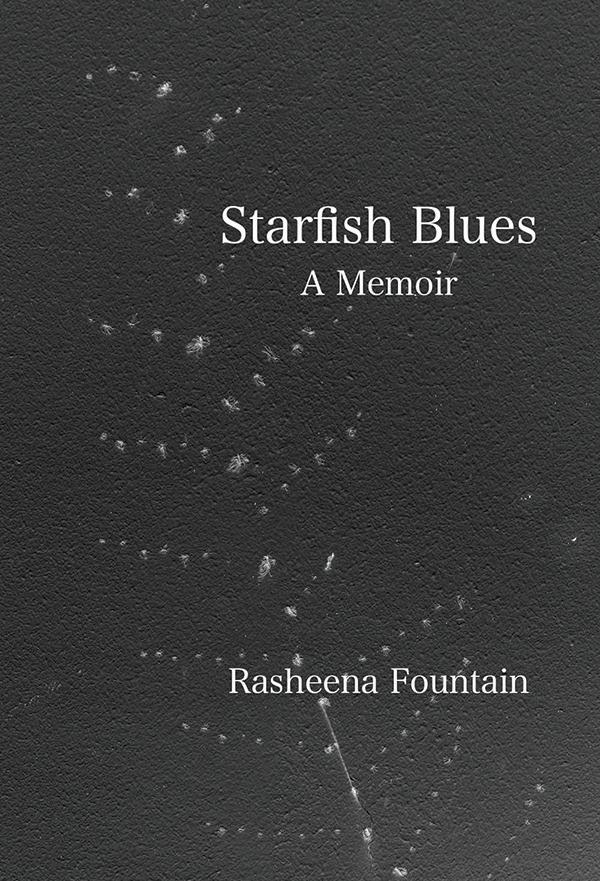
“Starfish Blues: A Memoir,” is published by Chin Music Press.
SINCE 2017, the student organization First Nations @ UW has hosted a November dinner in celebration of Native American community and culture. The event, initially organized by the Native American Student Commission, started out as a potluck for students, faculty and staff. Most recently, the dinner—a counterpoint to Thanksgiving—drew more a few hundred people from throughout campus and the wider community.
In a week that focuses on a national holiday that many Native Americans regard with mixed emotions, the UW students created an event of comfort and community building. “It has evolved into bringing in more people from different cultures, family members and just celebrating cultures through food, story telling, singing and dancing, and just being together,” says Chenoa Henry (Tulalip), director of —Intellectual House, where the event was held.
This year, students Adia Bowen/tsi and Ethan Miedema welcomed guests, providing insight into the history and significance of Taking Back the Dinner. They also talked about how they valued the warmth and support of the extended Native community.
Isaaksichaa Braine (Crow), a Ph.D. student at the iSchool and founding director of —Intellectual House, talked about his journey as a first-year college student at the UW as well as his later efforts to raise support for the first phase of —Intellectual House and his drive to support fellow American Indians at the UW.
The goal is to make the space feel like home and the event feel like a family dinner particularly for the Native students who come to the UW from smaller reservations and across the country, Henry says: “Any time we’re able to have drumming and singing and food, we’re living up to our vision.”
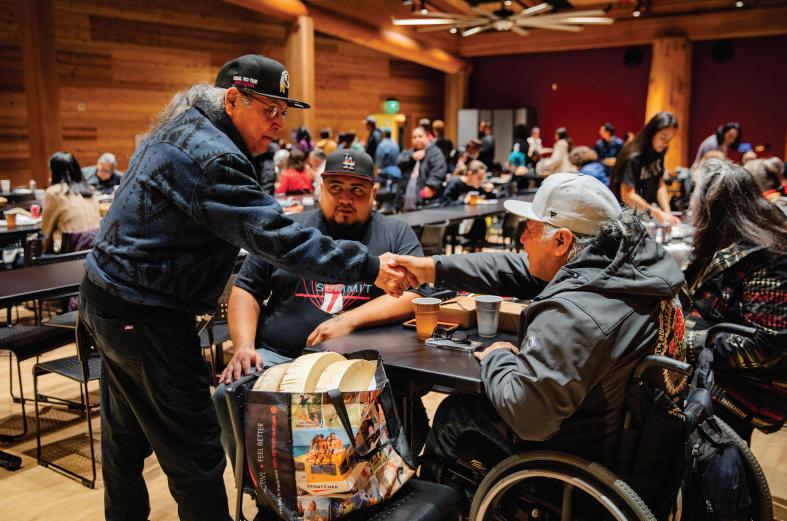
1945-2023
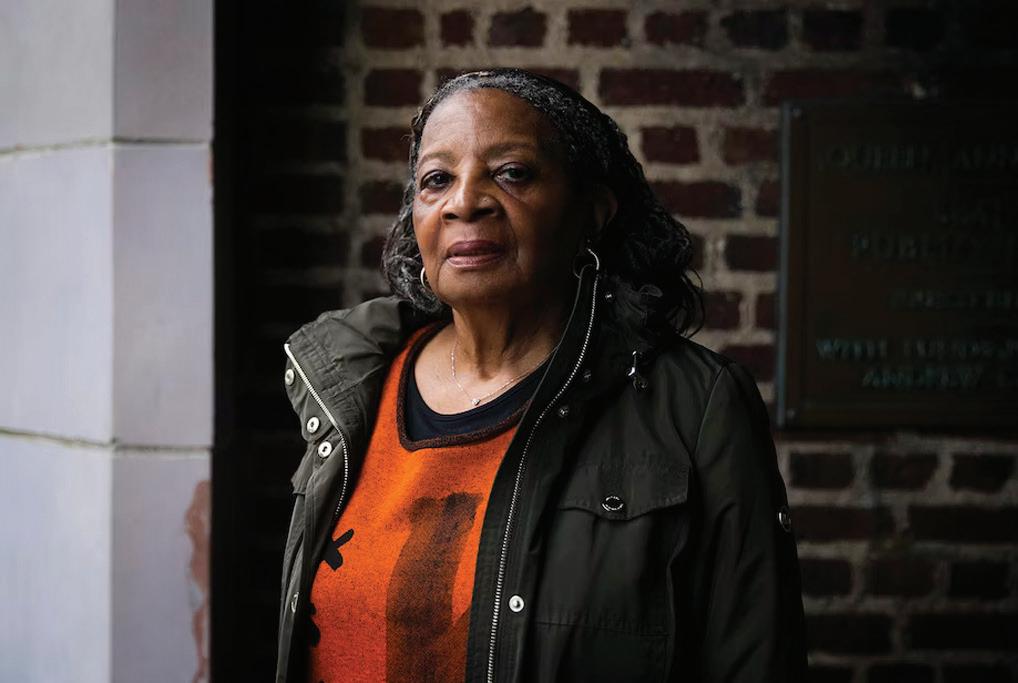
Famed
poet was also the first Black woman to be a UW full professor
AT AGE 35, Colleen McElroy discovered her calling. Already a speech pathologist and head of Speech and Hearing Sciences at Western Washington University, she enrolled at the UW to pursue a Ph.D. in ethnolinguistic patterns of dialect differences and oral traditions. She also started writing poetry.
She was born in St. Louis in 1947. Her mother and grandparents inspired her love of story, and her travels around the country and to Europe with her military family catalyzed her lifelong love of travel. She earned an associate degree at Harris-Stowe University, a historically Black university in St. Louis, and a bachelor’s and master’s at Kansas State.
Finishing her UW doctorate in 1973, McElroy joined the English Department faculty. During her first nine years, she oversaw freshman composition for students in the Educational Opportunity Program. In 1984, she became a full professor at the UW, the first Black woman to do so. She also directed the creative writing program and helped create the program’s Master of Fine Arts degree.
Meanwhile, her writing career was taking off. Established local poets welcomed her to their fold and encouraged her pursuit of the craft, among them, Richard Hugo, ’48, ’52, and UW creative writing instructor Denise Lever-
tov. But McElroy’s creative work was most inspired by African American poets, including Gwendolyn Brooks, Langston Hughes and Anne Spencer. McElroy published her first chapbook of poems, “The Mules Done Long Since Gone,” in 1972. That kicked off a prolific and distinguished journey of poems, books of poetry, short stories and travel writing. She won the American Book Award in 1985 for “Queen of the Ebony Isles” and the PEN Oakland National Literary Award in 2008 for “Sleeping with the Moon.” She also garnered two fellowships each from National Endowment for the Arts and the Fulbright program, a Rockefeller Fellowship, a Reader's Choice Award, a DuPont Visiting Scholar Fellowship, a Pushcart Prize and a Washington State Governor’s Distinguished Artist Award.
From 1995 to 2007, McElroy was poetry editor and editor-in-chief for The Seattle Review. She retired from the UW in 2006, becoming a professor emerita. She loved to dance, travel and be a resource for other Black poets. In all, she published 10 books of poetry, two books of short fiction and four nonfiction books. In one of her essays, she described herself as “a woman who will not stay put”—the words seem to describe her love of travel as well her passion for putting pen to paper. McElroy died Dec. 23 at age 88.
Charles E. Odegaard Award Recipients
2023 Norma Zavala
2022 Frank Irigon
2020 Emile Pitre
2019 Marvin Oliver
2018 Ricardo S. Martinez
2017 Joanne and Bruce Harrell
2016 Richard A. Jones
2015 Colleen Fukui-Sketchley
2014 Denny Hurtado
2013 Rogelio Riojas
2012 Gertrude Peoples
2011 Assunta Ng
2010 Nelson Del Rio
2009 W. Ron Allen
2008 1968 Black Student Union
2007 Alan T. Sugiyama
2006 Charles Mitchell
2005 Mike McGavick
2004 Jeff and Susan Brotman
2003 Herman McKinney
2002 Constance L. Proctor
2001 Ernest Dunston
2000 Vivian Lee
1999 Albert Black
1998 Bill Hilliard
1997 Andy Reynolds
1996 Hubert G. Locke
1995 Ron Moore
1994 Bernie Whitebear
1993 Ron Sims
1992 Sandra Madrid
1991 Ken Jacobsen
1990 Herman D. Lujan
1989 J. Ray Bowen
1988 Frank Byrdwell
1987 Andrew V. Smith
1986 Phyllis Kenney
1985 Norm Rice
1984 Nancy Weber
1983 William Irmscher
1982 Mark Cooper
1981 Millie Russell
1980 Minoru Masuda
1979 Toby Burton
1978 Vivian Kelly
1977 Sam and Joyce Kelly
1976 Leonie Piternick
1975 Larry Gossett
1974 Dalwyn Knight
Leonard Forsman’s love for cultural preservation has led to a life of service
By Eric Moss and Hannelore SudermannLeonard Forsman, ’87, grew up in Suquamish on the Port Madison Indian Reservation. His father served as tribal chairman while his mother helped develop education programs for young children. As a result, Forsman had early exposure to tribal government and working for the good of his community.
In May, the Suquamish Tribe chairman and UW Regent will be honored with the Charles E. Odegaard Award. As a longtime advocate for Native rights and civil rights, and the first American Indian appointed to the Board of Regents, Forsman is receiving the highest University of Washington communityawarded honor for his work advancing diversity, equity and inclusion.

“Chairman Forsman has not only raised awareness about Native issues, but his leadership and advocacy has improved the lives of thousands of American Indians in the Pacific Northwest and nationally,” says Rickey Hall, vice president for Minority Affairs & Diversity and the University diversity officer. “He has been a consistent voice of support and a champion for those who have experienced discrimination, are underrepresented and underserved.”
In the early 1980s, Forsman enrolled at the UW to study anthropology and worked as an intern at the Suquamish Tribal Archives in partnership with the Burke Museum. Pursuing a master’s degree in historic preservation at Goucher College, he studied the relevance of the National Register of Historic Places to tribal cultural values systems. After completing his degree, he returned to the tribe, worked as an archaeologist and later served as director of the Suquamish Museum.
Forsman was elected to the Suquamish Tribal Council over 30 years ago and became tribal chairman in 2005. He is also president of the Affiliated Tribes of Northwest Indians and Northwest regional vice president of the National Congress of American Indians. He serves on multiple tribal, intertribal and intergovernmental boards and commissions including the Kitsap County Regional Coordinating Council, the Friends of
Waterfront Seattle, the Washington Indian Gaming Association and the West Sound Partners for Ecosystem Recovery.
President Obama appointed him to the National Advisory Council on Historic Preservation in 2013 and 2016, when Forsman served as vice chairman. In 2021, Gov. Jay Inslee named him to the UW Board of Regents. Forsman is also active in the Tribal Canoe Journey as a puller in the Seaah-ma-oaks voyaging canoe. He takes pride in the cultural resurgence projects that culminated with the Suquamish Tribe hosting of the Canoe Journey in 2009. Forsman and others continued the efforts of previous Suquamish Chairman Benny Armstrong to return the land of Old Man House Park to the Suquamish Tribe. In addition to a new longhouse to replace the one that was burned down by an Indian agent, the project funded a new pier, an early learning center and the restoration of Chief Seattle’s grave site.
Reflecting on his support for social justice and his history of advocacy, Forsman says that it is more than just standing up for what is right, it is part of the culture of the Suquamish. “Our tribe is very sensitive to discrimination, because we’ve been subjected to it since contact,” he says. “We are very sensitive to protecting people’s rights and human rights.”
The Charles E. Odegaard Award honors individuals whose leadership in the community exemplifies the former UW president’s work on behalf of diversity. The awardee is recognized at the annual Celebration event.
Join faculty, students, alumni and staff for the Annual Celebration Gala at 5 p.m., May 15, at the HUB. For more information: washington. edu/omad/celebration
